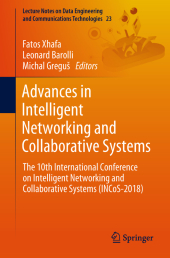 Neuerscheinungen 2018Stand: 2020-02-01 |
Schnellsuche
ISBN/Stichwort/Autor
|
Herderstraße 10
10625 Berlin
Tel.: 030 315 714 16
Fax 030 315 714 14
info@buchspektrum.de |

Leonard Barolli, Michal Gregus, Fatos Xhafa
(Beteiligte)
Advances in Intelligent Networking and Collaborative Systems
The 10th International Conference on Intelligent Networking and Collaborative Systems (INCoS-2018)
Herausgegeben von Xhafa, Fatos; Barolli, Leonard; Gregus, Michal
1st ed. 2019. 2018. xlv, 537 S. 249 SW-Abb. 235 mm
Verlag/Jahr: SPRINGER, BERLIN; SPRINGER INTERNATIONAL PUBLISHING 2018
ISBN: 3-319-98556-6 (3319985566)
Neue ISBN: 978-3-319-98556-5 (9783319985565)
Preis und Lieferzeit: Bitte klicken
This book provides the latest research findings, and discusses, from both theoretical and practical perspectives, innovative research methods and development techniques related to intelligent social networks and collaborative systems, intelligent networking systems, mobile collaborative systems and secure intelligent cloud systems. It also presents the synergies among various paradigms in such a multi-disciplinary field of intelligent collaborative systems.
With the rapid development of the Internet, we are experiencing a shift from the traditional sharing of information and applications as the main purpose of the Web to an emergent paradigm, which locates people at the very centre of networks and exploits the value of individuals´ connections, relations and collaboration. Social networks are also playing a major role in the dynamics and structure of intelligent Web-based networking and collaborative systems.
Virtual campuses, virtual communities and organizations strongly leverage intelligent networking and collaborative systems by means of a great variety of formal and informal electronic relations, such as business-to-business, peer-to-peer and various types of online collaborative learning interactions, including the emerging e-learning systems. This has resulted in entangled systems that need to be managed efficiently and autonomously. In addition, the latest, powerful technologies based on grid and wireless infrastructure as well as cloud computing are currently enhancing collaborative and networking applications significantly, but are also facing new issues and challenges. The principal purpose of the research and development community is to stimulate research that will lead to the creation of responsive environments for networking and, in the longer term, the development of adaptive, secure, mobile, and intuitive intelligent systems for collaborative work and learning.
Findings from a Success Factor Analysis for SaaS Usage.- Distributed Computation for Protein Structure Analysis.- Detection of Defects on SiC Substrate by SEM and Classification using Deep Learning.- Expert Knowledge-Based Authentication Protocols for Cloud Computing Applications.- Performance Evaluation of WMNs for Normal and Uniform Distribution of Mesh Clients Using WMN-PSOSA Simulation System.- Spectrum Trading in Wireless Communication for Tertiary Market.- State Based Load Balancing Algorithm for Smart Grid Energy Management in Fog Computing.- A Readiness Model for Measuring the Maturity of Cyber Security Incident Management.


